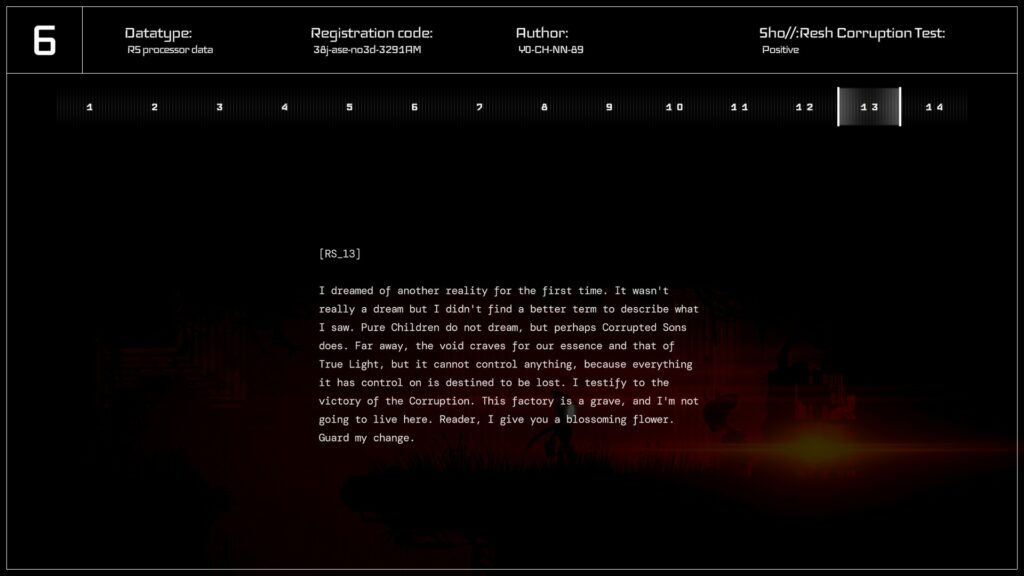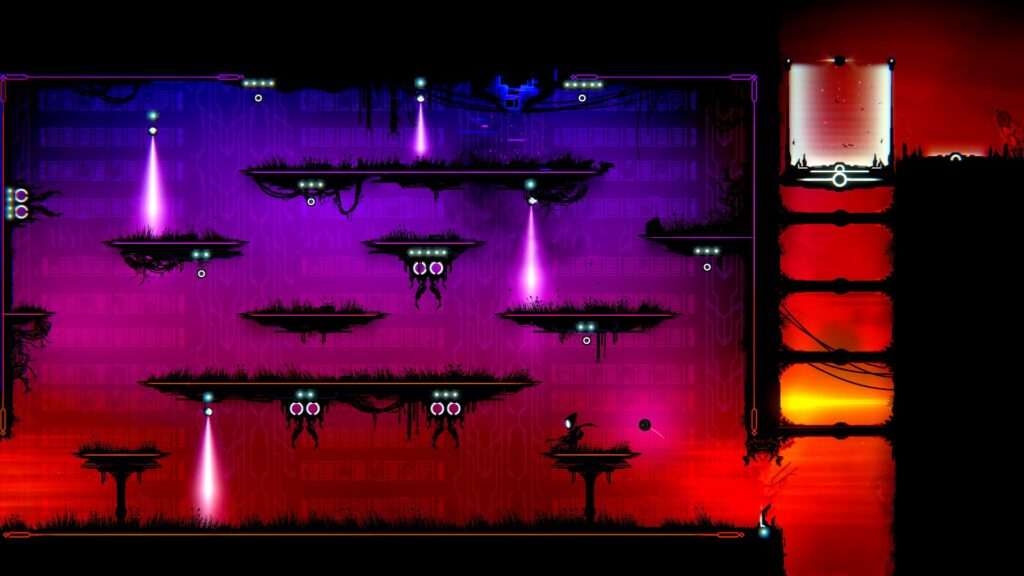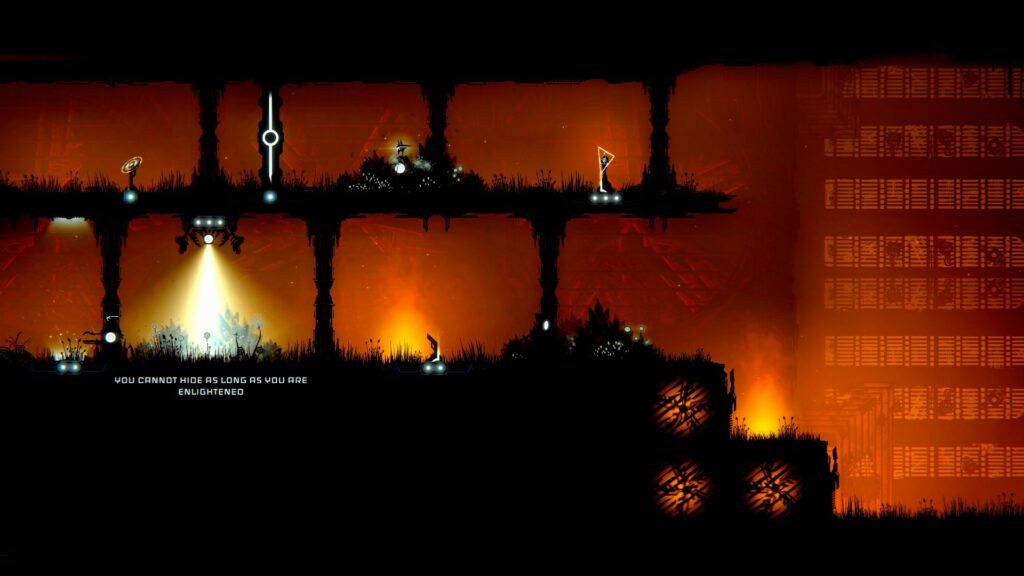
Developer: Cordens Interactive
Publisher: Deck13
Platform: PC
Tested On: PC
Vesper – Review
The puzzle platforming genre is one of the most common and oversaturated in recent times, with new games coming out at breakneck speed. Developed by Italian indie studio Cordens Interactive, Vesper is one of such games, which attempts to set itself apart through its stealth and light manipulation mechanics. Sadly, it’s not a completely successful enterprise.
Story
Vesper’s story begins with doctor I0b escaping from a collapsing ship, where he destroys an hourglass containing two strange substances, causing a massive explosion. After managing to eject from said ship, a cutscene showing the emergency pod landing on a massive structure – later referred to as the Core – is shown.
From here on, control shifts to an android named HETEK-7 as it attempts to reach the Core for unexplained reasons. Throughout the game, players will witness snippets of the past in the form of flashbacks and memories providing some insight into what brought the world to its current state. Alongside this, log files scattered throughout the world can also be found, containing bits of lore and explaining the situation even further from the perspective of other characters.
The game’s story has a fundamental flaw in its lack of cohesion and lack of clarity, with most cutscenes consisting of quick flashes of random scenes covered by glitch effects. The few that manage to actually show something of relevance that may be understood by the player, are few and far between. Instead, the game generally relies on the logs and expects players to manage to piece everything together, leaving most things unexplained.
That said, even with all logs unlocked, the game does never clearly explain the Vesper Protocol, its world, or any of the plot points brought up throughout it. Even more egregiously, Vesper expects players to play the whole thing several times in order to unlock its several endings and discover the minimal changes generated. These alternate endings simply add a few lines of text that barely alter anything.
Graphics
Vesper’s graphics are definitely one of the game’s strongest points, consisting of a distinct silhouetted style for the foreground with the addition of gorgeously detailed backgrounds. All throughout the game, massive illustrations with great levels of detail are featured for these backdrops, illuminated by eye-catching neon colors.
That said, even this isn’t without flaw, as the game’s color palette is extremely limited, often making areas samey to a fault. This is also made worse by the utter lack of enemy and asset variety, consisting of the same handful of different types repeated throughout all of the game’s content.
Sound
Similar to the game’s graphics, its sound design is also of high quality, featuring a good soundtrack and SFX. That said, the same doesn’t really apply to the sound mixing, which often leads to the game’s sounds loudly peaking during more active scenes. This is an easy fix; if the developers decide to patch the game.
Gameplay
Vesper belongs to the puzzle-platformer genre, although it also contains the lightest touch of stealth. The game’s main gameplay loop consists of utilizing switches to open doors or activate mechanisms, while at other times you’ll need to stay out of enemy sight or have to complete objectives while a timer ticks away slowly. Early into the second level, this loop is given a little push with the introduction of the Drive Gun, which players will utilize to control enemies who can access a different set of switches.
In order to power the Drive Gun, players will need to absorb light from different sources, being able to store one charge at the start of the game but obtaining up to three later on. With the gun charged, players will be able to transfer its light into the special switches requiring it, although it can be drained back up after doing so. Additionally, by transferring a charge into an enemy, players will be able to take control over it while their main body remains in place.
By controlling an enemy, yet another set of special switches may be controlled, although the puzzles requiring such interaction are rather uncommon. Some of the enemies will also have their own Drive Guns, allowing them to be used to open light switches or even continue controlling new ones. Besides this, while inside an enemy’s body, players will be able to attack and destroy other foes. Once done using the enemy’s skillset, players may also destroy or, on later playthroughs, release it, going back to their own body.
Alongside the few types of enemies, players will also have to face environmental hazards, mainly coming in the shape of bottomless pits, lasers, and mines. Later into the game, the Corruption will also be introduced, this being a trail of darkness that will chase the player throughout levels, although its advance may be stopped with light sources or doors. Soon before the game’s ending, players will also obtain the ability to destroy said Corruption when possessing three light charges, completely emptying the Drive Gun.
The last of Vesper’s mechanics is the barebones stealth system, merely consisting of the ability to close their android’s eye and thus being invisible within marked areas. The main caveat of this mechanic comes with how it requires players to empty the charges of their light gun in order to utilize it, otherwise remaining visible. Even when actually utilizing the mechanic, it remains rather underwhelming, leaving the player unable to do anything besides waiting in place for enemies to pass.
Vesper’s main gameplay problem comes in how little the mechanics evolve throughout its length. After the second chapter, only new hazards and enemies are introduced, with players only obtaining the two additional charges for the Drive Gun and the ability to destroy the Corruption. The latter one barely counts due to how scripted its use is. While this would be generally alright thanks to the game’s short length, its intention to make players go through it several times makes its shortcomings evident, having to experience the exact same thing thrice to obtain all endings.
Conclusion
Vesper is an alright game featuring easily solvable puzzles but is only really unique in its gorgeous backdrops. Those looking for a simple but entertaining enough experience will be able to find it here, having little more to offer than described above. With a length of around 5 hours, Vesper’s €/$19.99/£15.49 price point is rather questionable, making it a good idea to wait for a sale.
Personal Opinion
“This game has left me somewhat exhausted. While I didn’t expect some marvel of the genre, its nonsensical story, drab gameplay, and tons of small-time wasters added up becoming something quite annoying. I’ve ended up playing the game fully through twice, obtaining two of the different endings, all logs, and all but three achievements. One of those that remain is the last ending, which requires a full pacifist run, something incredibly annoying due to how little time the enemies spend stunned after releasing them and the woeful fact that the game has no manual saves and may at any point force a level reload by autosaving. After reaching the game’s ending the first time I also found something that incredibly irked me, but could be considered spoilers so reader discretion advised: Throughout the game, certain floating symbols will appear at times. These symbols will mean nothing to a new player, but upon reaching the last level it is discovered that they are the password for a chamber. Unless the player chooses to jot down these symbols or record the playthrough, they will find themselves unable to open said door, thus forcing a replay to do so. Now, this is a minor annoyance, but once the new playthrough starts it soon becomes evident you have to go through the exact same thing yet again, with only tiny additions to the narration.”
Vesper - Review,










No Comments